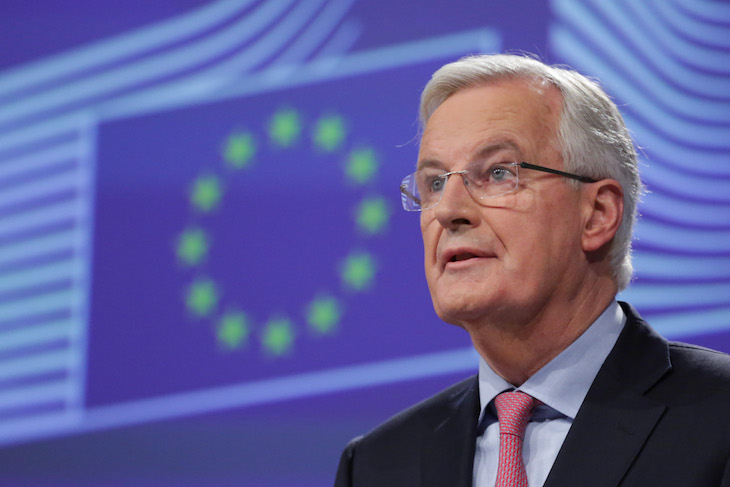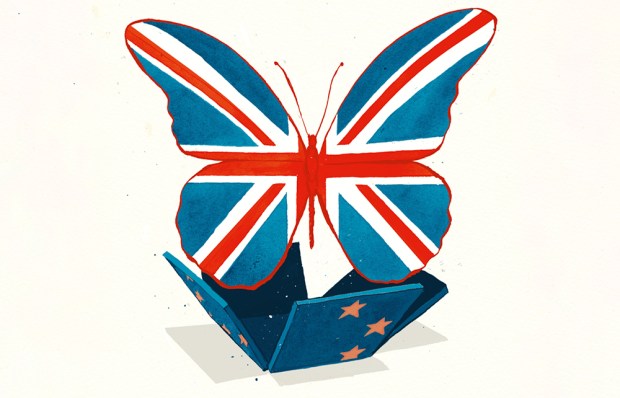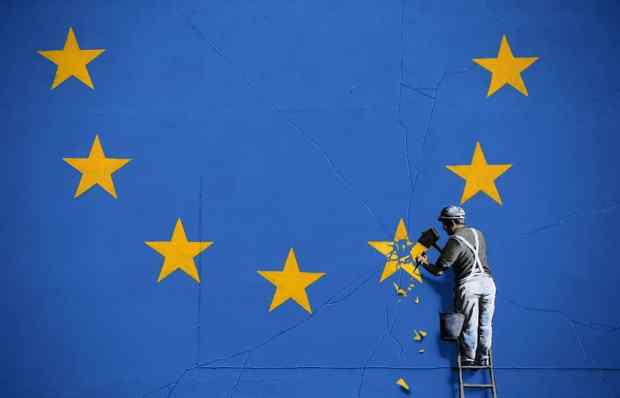There’s an unwritten law governing Boris Johnson in Westminster: every-thing he says or does is a gaffe, or can be portrayed as one. Yet actually Johnson has an uncanny knack for conjuring similes which sum up the political situation precisely. So it was for his much-ridiculed remark, in response to a question about the Irish border, that there are no border posts between London boroughs even though they have different business rates and policies on various other things. His phrasing was careless but the point stands: it is nonsense to claim that different regimes must mean border patrols. There are significant tax and excise differences on either side of the Northern Irish border, but they’re managed without any need for checkpoints. It’s amazing what can be achieved through goodwill.
But goodwill is not a commodity in abundant supply in the offices of Michel Barnier, who likes to portray the Irish border issue as one that can be solved only by keeping Northern Ireland within the customs union. That is quite absurd. Switzerland has for many years managed to operate as part of the Schengen area with scant customs formalities on its borders with four EU states, in spite of it not being part of the EU or the customs union. So why can’t Britain and Ireland continue to operate their own mini-Schengen?
Better still, if the EU would get on and do as it promised to do last December and open talks on a post-Brexit trade deal, we might well find that there will be no tariffs to collect on goods crossing the border between Northern Ireland and the Republic. Even if there were tariffs, it does not follow that there would be any need for formal customs posts. We do not have HMRC officials hovering over tills in Marks and Spencer to make sure that VAT is being collected and paid, so why the need to collect import duties at a fixed barrier? The money could quite easily be collected through the tax system.
The EU has become fixated on the Irish border partly because the Irish PM Leo Varadkar is making a stand on the issue in order to appeal to Sinn Fein voters. That serves the purposes of M. Barnier, for now. For months the EU’s chief Brexit negotiator refused to start trade talks until Britain had agreed to pay a leaving bill. Then, when Theresa May agreed to that in December, he picked on another stumbling block — as well as dismissing any British proposals on trade as an attempt to have our cake and eat it.Barnier’s language and behaviour are regularly a cause for dismay in European capitals, which seek quick and good-natured Brexit negotiations. It is a trial for everyone.
For months, the UK government has tried to progress talks. The EU’s publication of this week’s ‘legally binding’ treaty on Brexit must, however, mark a turning point. It contains a proposal — to erect an internal border between Northern Ireland and mainland Britain — which is so obviously unacceptable that Theresa May has no option but to reject it. Even if she felt minded to concede, there is not the slightest prospect that DUP MPs, on whom she depends for a majority, would allow any attempt to drive a wedge between Northern Ireland and the rest of the UK.
If we are to achieve the free and open trade which is in the interests of everyone in Europe, it has become necessary to go above the heads of Barnier and his team and talk to individual member states. Outside of Brussels, there is little sign of any desire to punish Britain for leaving the EU. There might be regret, but there is a wish to build a constructive ongoing relationship in everyone’s mutual interest. European businesses don’t want tariffs and trade barriers any more than we do.
The Italian government, for example, recently said that it would be unrealistic to expect a future trade deal to exclude financial services. If that kind of attitude ruled in Barnier’s team, we would have a trade deal resolved in no time. Perhaps this is why M. Barnier is protesting about David Davis making so many visits to European capitals: Davis is creating an atmosphere of harmony that is unsuited to Barnier’s agenda.
There are signs that many in Europe — especially its exporters — are increasingly fed up with the obstructive attitude of the team appointed to conduct Brexit negotiations on their behalf.Barnier fancies himself as a successor to Juncker, who steps down next year, and he is no great fan of the idea that the European Commission should be answerable to national governments. So he is eager to create obstacles. It now seems likely that Barnier co-ordinated his Irish border gambit with JeremyCorbyn, who announced this week his backing for ‘a customs union’. This type of behaviour could backfire badly, emboldening those Tories who want to walk away from Brexit talks altogether.
Kristalina Georgieva, who runs the World Bank, says she decided to resign as a vice president of the European Commission when she found out that Barnier had been put in charge of Brexit talks. At the time, this seemed baffling: why such a strong reaction? Now it makes sense. Brexit is difficult, and Barnier’s tactics are making it far more so — often to the dismay of the member states that he is supposed to be serving. The Prime Minister will need all of her patience, resolve and allies in the months ahead.
Got something to add? Join the discussion and comment below.
Get 10 issues for just $10
Subscribe to The Spectator Australia today for the next 10 magazine issues, plus full online access, for just $10.
You might disagree with half of it, but you’ll enjoy reading all of it. Try your first month for free, then just $2 a week for the remainder of your first year.














Comments
Don't miss out
Join the conversation with other Spectator Australia readers. Subscribe to leave a comment.
SUBSCRIBEAlready a subscriber? Log in